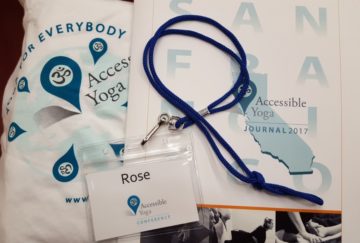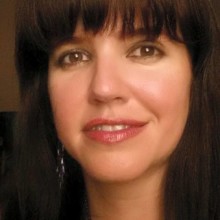This month I presented at the Accessible Yoga Conference in San Francisco! Accessible Yoga, founded and directed by Jivana Heyman, is an international grassroots organization dedicated to sharing yoga with everyone. This conference brings together a wide assortment of teachers and practitioners, all of whom have a shared goal of bringing yoga to all, “if you have a body and you have a mind, you can practice yoga.” This conference is run by a team of volunteers, yet you wouldn’t know it. The conference was laid back, friendly, and all events began and ended on time.
There were two prominent themes that ran through the conference. The first was connection, to self and to others. The opening session began with connection to self through a meditation led by Swami Ramananda of Integral Yoga. After remarks from Jivana Heyman, we were asked to meet and connect with people around us. This experience of connecting with others was repeated throughout the conference, at meals, and outside of the conference. It was one of the friendliest environments I have been in!
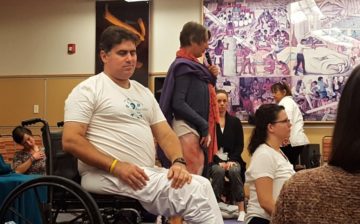
The second theme was, as Jivana pointed out during the opening session, “there is no correlation between ability and peace of mind.” All sessions addressed the need to adapt yogic practices to all levels of ability, all body types/size, all races, and all economic statuses. In a panel on Creating Equity in Media Imagery we discussed how advertising excludes differently-abled bodies — including pictures on social media. Seeing a young, thin, smiling woman in a very bendy pose gives the message that yoga is only for people with those abilities. Baxter Bell led a session on Yoga for Healthy Aging. This mostly-power point session, was interspersed with practices like breath with a visualization, movement that focused on right/left brain hemisphereic integration (cross body actions), and the simplest of movements. It was a nice reminder that simple is often more profound for most people.
I particularly got a lot out of Chinnamasta Stiles’ session, Moving from Pain to Ease – Restoring the Flow of Prana. She is the lineage holder for Mukunda Stiles, who I was lucky enough to meet and study with, briefly, about 10 years ago. Chinnamasta led us through the Joint Freeing Series, which has been a part of my practice since I learned it in 2005. During the session, she emphasized the need to embody the practices that we share with clients and students. For this reason, we participated as we watched a demo from Rudra (treasurer of Accessible Yoga) practicing in a wheelchair and Chinnamasta’s assistant Lia. Some participants practiced lying down, while others were standing. The adaptations of this seemingly simple Joint Freeing Series were quite profound.
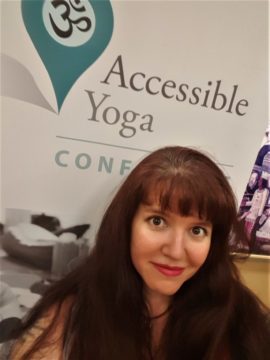
I got to lead a session called Accessible Yoga Tools for Mood Management: LifeForce Yoga. My focus was on our LifeForce Yoga practices and how they can be modified to work well in chairs, in bed, in airplanes, etc. I also placed an emphasis on feeling your feelings – when we repress or suppress what is rising, we divide ourselves from ourselves. Cultivating the listening connects us to our true selves. We had a lovely session; we breathed, we visualized, we made noise, we laughed, we cried, and, we felt our feelings!
Other topics covered at the conference were: Yoga as a Therapeutic and Best Practice Tool for Rehabilitation and Recovery from Hospital to Home, for Permanent or Temporary Disability with Mary-Jo Fetterly; Empowering Self & Uniting Community through Seva with Joy Ravelli; Courageous Women, Fearless Living: Yoga for Women Touched by Cancer with Linda Sparrowe; Healing Chronic Homelessness with Freidel Kushman and Miarco Tiama; Inclusive Yoga for Children with Autism and Special Needs with Shawnee Thornton Hardy; and so much more. Conference attendees were people of all color, people of all ages (ranged from their early twenties, all the way up to the seventies and eighties!), and people of all physical abilities. It was a beautiful and diverse group, all interested in serving from the heart.
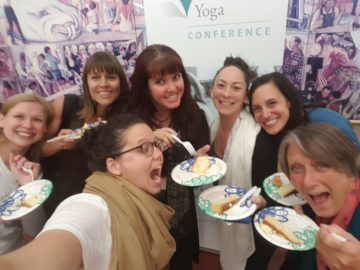
At the closing session, Kriya let us in a guided relaxation. Again, Jivana spoke, saying that our dynamic in yoga and needs to be shifted. Teachers and students are on an equal ground, the teacher should not be placed on a pedestal. Instead, yoga is collaboration and creativity between students and teachers. Linda Sparrowe was our closing keynote speaker. Her speech can be summed up in one sentence: there is room for all of me at the table. We don’t just let the bad stuff going push that under the table and only elevate the good stuff, we need to welcome all of us into the room. The parts of us that are difficult or challenged are inviting us to be kinder, gentler and more present. But through this, we come to an understanding of ourselves as love that our true nature is goodness. And it is from this place that we practice the generosity of sharing yoga.
The most valuable part of this conference was connecting with so many differently-abled people. Even though I work with different bodies, every session provided the reminder that yoga is still yoga and has profound effects for people even when the movement is minimal or almost imperceptible. The lesson I would like to leave all teachers with is to let your students express their yoga in the way that is most appropriate for them, even if it seems like they are doing nothing at all.
Hats off to you, Jivana and team, thank you! Accessible Yoga

